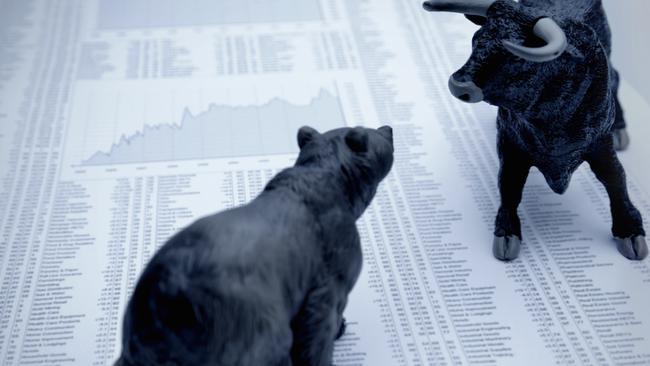7 investment rules that have been rewritten for wealth
Times have changed dramatically for investors, and it's a good idea to understand the new rules and how you can react.
Business
Don't miss out on the headlines from Business. Followed categories will be added to My News.
Rules are made to be broken, they say, but when thousands of dollars are involved – sometimes millions – there are consequences for Australian investors.
Whether it’s shares, real estate, fixed interest or other asset classes, the fast-changing world has seen many of the traditional rules rewritten, producing both winners and losers.
The Covid pandemic in 2020 and 2021 caused havoc for investors, governments and economies, but that alone does not explain the huge shifts in the way people buy, sell and make money from investments.
Nobody knows what financial markets will do in 2024, but it can be a valuable exercise to look back at the past – even if just to understand how things are always changing.
Here are seven examples where the traditional rules of investment have been thrown out the window, prompting people to adapt, evolve and hopefully prosper in the future.
1. CRAZINESS REIGNS
Wilson Asset Management chairman Geoff Wilson said he started in funds management in 1980 and “in those days there were very clear business cycles”.
Strong growth would be followed by rising interest rates, which would squash demand and cause a recession, and then the next business cycle would start, Mr Wilson said.
Since the 1990s recession Australian had “pretty much had 30 years of solid growth, and all the rules have been rewritten in terms of how you would invest”, he said.

“Everyone I talk to is saying this is a very strange period, where we all thought the increases in interest rates would have had a greater negative impact on the economy and also on the stockmarket.
“But we’ve got interest rates going up and we have got equites going up, and it should be an inverse correlation. Unfortunately they can’t keep going forever.”
Would this put equity markets under pressure, or were markets looking forward and already predicting interest rates to start falling, Mr Wilson questioned.
“Personally I would be holding a little bit more cash at the moment,” he said.
The pandemic is partly to blame for today’s strange times for investors, and the huge piles of money handed out by governments to prop up economies won’t last forever.
“In the first quarter of next year, it looks like that Covid cash cushion is going to evaporate,” Mr Wilson said.
2. SAFE AS HOUSES?
Residential real estate has long been a licence to print money for long-term investors, but new rules are being written regularly that are deterring landlords from buying property and prompting others to exit the sector completely.
Author, property investor and university lecturer Peter Koulizos said rules for landlords and tenants were changing and it was having an impact.
“The residential tenancies legislation has put off a lot of long-term property investors,” he said.
Some are selling because of increasing complexity, Mr Koulizos said, while others are hiring professional property managers for the first time to keep on top of rule changes.
“It’s just so much harder to manage property with the changing landscape of legislation,” he said.
“Property is not as tax-effective as it used to be.”
Governments on both sides have shifted the goalposts in the past decade, with tougher tax rules for travel and depreciation introduced by the previous Coalition government, followed by harsher taxes and tenant-friendly, anti-landlord changes imposed by some state Labor governments more recently.
The exodus of property investors is intensifying the rental crisis, with fewer properties available pushing up demand and rents.
“In a time where we are desperate for people to buy rental properties, we need to make property investment more attractive, not less attractive,” Mr Koulizos said.
3. GOING GLOBAL
A decade or so ago, few investors bought overseas stocks directly, and many had all their share market holdings in Australia.
They stuck with the ASX because of its familiarity and the fact that it was complicated and expensive to invest in overseas markets. Sadly they suffered the consequences, because since 2007 the benchmark S&P/ASX 200 index has moved slightly higher but US stocks – as measured by the S&P 500 index – have trebled in value.

Shaw and Partners senior client adviser Jed Richards said for today’s investors it was just as easy and cheap to buy Microsoft or Amazon as it was to buy BHP.
“The technology wasn’t there to allow us to buy international shares simply – it was reserved for the high net worth individuals, he said.
“When I look at the performance of clients over the last 15 years, the ones who were first to adopt international exposure have far outperformed the ones who stuck to Australian only.”
A majority of Australian superannuation funds’ member savings is now invested offshore rather than at home, which makes sense in global financial markets where Australia is just a small fraction.
4. BANKING ON THE BANKS?
A traditional investment rule was to buy banks for high dividends and handy capital growth, but these days the growth is gone and the dividend yields they pay are often matched or beaten by resources giants such as BHP and Fortescue Metals Group.
“The banks aren’t growing anymore,” Mr Richards said.
“They are the major lenders in Australia but they don’t grow.
“Twenty years ago those banks were making acquisitions, they were doing things to get more and more business. But with the royal commission they have gone the other way.”
In contrast, commodity prices were in a super-cycle and this was propelling the profits, share prices and dividends of resources stocks higher.
“With the growth of China and India, commodities are still in hot demand so the cycle doesn’t seem to go in a natural pattern anymore,” Mr Richards said.
5. BONDS AND STOCKS DON’T BALANCE
Traditional thinking suggested owning both shares and fixed interest, such as government and corporate bonds, delivered portfolio balance because when one asset class rose the other often fell.
That’s out the window too.
In 2022 shares and bonds both fell at the same time, as fast-rising central bank interest rates scared off stock market investors and weakened the values of existing bonds as new higher-interest bonds were offered.
“Bond returns are relative to interest rates, and with rates low (until recently) they haven’t had a worthwhile return,” Mr Richards said.
“Now with rates higher there is more interest in bonds than there was.”
Another fast-growing form of fixed interest is bank hybrid securities, which are a mixture of shares and bonds and offer good returns.
“Bank hybrids have grown dramatically – now most of our retail clients’ portfolios have exposure to hybrids,” Mr Richards said.
“Their returns are up at about 6.5 per cent now – that’s taken some of the appetite for bonds away, too.”
6. MORE THAN JUST MONEY
Profits and dividends once ruled investment markets, but today there are new factors impacting investors in areas such as environmental and social governance and an increased focus on philanthropy.
Mr Wilson said as young investors matured there was a lot more pressure on companies to make sure they do the right thing.
“We’ve seen the public hanging of CEOs effectively – Qantas and Optus,” he said. “The consumer and investor has an enormous amount of strength and companies know they have to do the right thing.”
Mr Wilson spearheads Future Generation investment funds “where the finance industry is effectively doing the right thing”.
“You have got fund managers that are managing money for free, and that allows 1 per cent of that money to go to youth mental health and children at risk,” he said.

“Since those vehicles were set up nine or 10 years ago, $75 million has gone into that area. That’s happened because the finance industry hasn’t taken its fees.”
Mr Wilson said there were other philanthropic investment vehicles, and the overall sector was now worth about $3bn.
7. TECH DRIVES INVESTMENT
It’s been a rollercoaster ride since technology investments burst into the spotlight in the 1990s, then collapsed after the dotcom boom at the turn of the Millennium.
Over the next quarter of a century several of those tech crash survivors became the biggest and most powerful companies on the planet. Think Microsoft, Amazon, Google (now called Alphabet) and Apple, whose share price growth is a key reason why the US stock market has outperformed Australia’s by so much since the global financial crisis.
Improving technology around trading and investing has also opened up more opportunities for investors.
“As individuals, with technology, you can buy any global company you want,” Mr Wilson said.
“The speed at which people get information, and because there is a lot more trading money around, it causes volatility in companies.
“If a company does something not that well, the share price could be down 20 or 30 per cent in a few hours.
“There’s a lot more momentum money, so don’t get caught. To be a good investor you have to switch off your emotions, so when you are fearful you shouldn’t be selling.”
Investors should be careful not be scared by volatility and “a lot more hot money in the market”, Mr Wilson said.
“Do not sell into an over-reaction,” he said.
Originally published as 7 investment rules that have been rewritten for wealth





